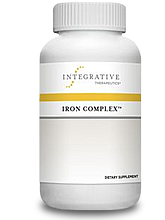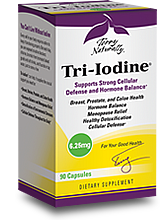6 Signs of Iron Deficiency in Fibromyalgia

Because of iron loss during menses, iron deficiency is especially common in women. It's also very common in fibromyalgia.
Iron and iodine are critical for optimal thyroid function. Iron is also critical for making red blood cells. Because of this, optimizing iron levels can have a significant impact on improving how you feel. There are six signs that suggest you may have iron deficiency. If you have any of these, you should have your doctor order a blood test called a "ferritin level" test to check your iron levels (this is really the correct iron test—ironically, an iron level by itself is pretty meaningless). But if you have this test, be careful of the evaluation you receive. Some doctors consider this test to be normal if it's over 8. Iron researchers say this is insane, and that 60 or higher is actually the optimal number! So if your doctor says your test result is normal, ask for the actual ferritin result and make sure that it's 60 or higher.
Below are common symptoms of iron deficiency. If you have any of these, I recommend you get a ferritin blood test. If you have fibromyalgia, you should also have a test performed called an "iron percent saturation" test, and make sure that the result is over 22%
1. Fatigue
Iron is critical for making red blood cells, as well as for optimal thyroid function. Low iron levels are a common cause of fatigue, even if you aren't actually anemic.
2. Hair Loss
Dermatologists at the Cleveland Clinic recommend that people trying to resolve thinning hair should bring ferritin levels to above 100.
3. Unexplained Infertility
Ferritin levels under 40 have been shown to be associated with unexplained infertility, with many of these women getting pregnant once they brought their iron levels up. (See "Treating Infertility—An Information Sheet for Couples" for information on how to optimize fertility.)
4. Restless Legs
Ferritin levels under 60 have been associated with Restless Leg Syndrome. You can calm your legs by optimizing iron and magnesium intakes, while also optimizing thyroid and adrenal function.
5. Cold Intolerance
Iron is critical for temperature regulation. Cold intolerance, along with low body temperatures, are frequently seen in people with iron deficiency, hypothyroidism, or the hypothalamic dysfunction present in fibromyalgia.
6. Anemia
By the time you get anemia, iron deficiency is very severe. In addition, people with fibromyalgia have a decreased blood volume, which makes them anemic despite normal blood counts.
Special Considerations in Fibromyalgia
Iron is critical for converting the inactive T4 thyroid hormone into the active T3 form. People with fibromyalgia already have trouble doing this, and T3 thyroid deficiency (again despite normal blood tests) is a major problem in fibromyalgia. In fact, proper use of T3 thyroid hormone can dramatically reverse fibromyalgia in a subset of people.
Iron is also critical for immune function. But this is a double-edged sword. Bacteria also feed on iron, so too much is also unhealthy. So while this is not the case for most supplements, it is important to check iron blood tests (ferritin and iron percent saturation) before supplementing.
Optimizing Iron Levels
Plant-based iron is poorly absorbed, so iron deficiency is an even bigger problem in vegetarians, though common in fibromyalgia in general. On the other hand, too much iron can be toxic. Because of this, I recommend you not take supplements unless you first have blood tests and find your ferritin level is either under 60, or you have iron percent saturation under 22%. If your ferritin is under 60, I recommend you take 25-50 mg of iron along with at least 50 mg of vitamin C (taken at the same time to boost absorption) each day. And you should continue rechecking your ferritin level every 3-6 months and only stop taking the iron when the ferritin is over 60.
By the way, it's normal for iron to turn your stools black. If it makes you constipated, add magnesium glycinate 200-400 mg a day (this also has dramatic health benefits).
Do not take iron within six hours of taking thyroid hormone, or you will not absorb the thyroid. I generally give iron at bedtime.
Got fibromyalgia? Checking iron blood testing is critical!

Jacob Teitelbaum, M.D. is one of the world's leading integrative medical authorities on fibromyalgia and chronic fatigue. He is the lead author of eight research studies on their effective treatments, and has published numerous health & wellness books, including the bestseller on fibromyalgia From Fatigued to Fantastic! and The Fatigue and Fibromyalgia Solution. His newest book (June 10, 2024) is You Can Heal From Long COVID. Dr. Teitelbaum is one of the most frequently quoted fibromyalgia experts in the world and appears often as a guest on news and talk shows nationwide including Good Morning America, The Dr. Oz Show, Oprah & Friends, CNN, and Fox News Health.


